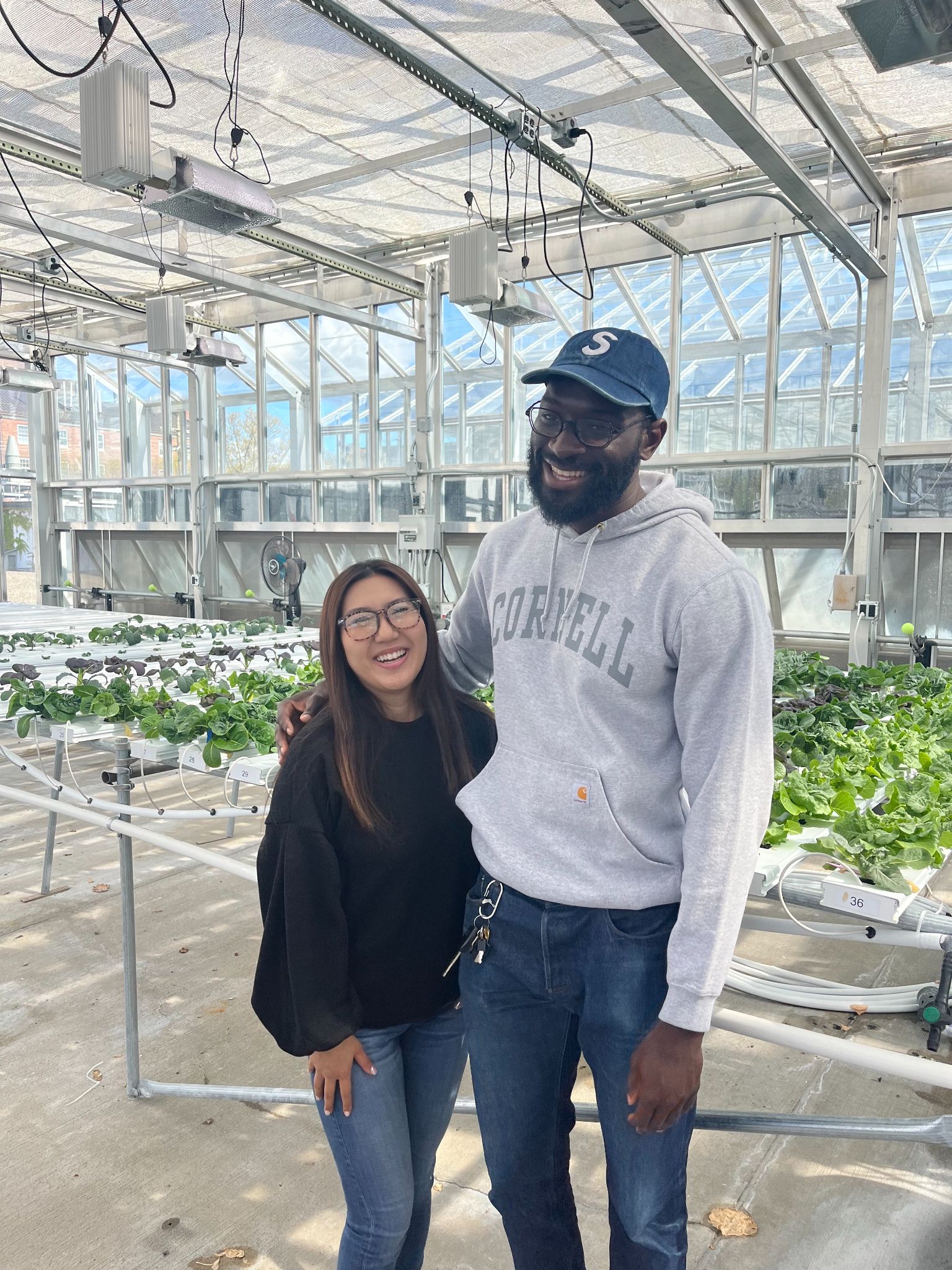Food Donor Spotlight: Cornell Hydroponics
Written by Kelly King-O’Brien, May 2023.
Interviewees: Hannah Lee and Olu Aliweri
Location: The Greenhouses at Cornell on Tower Road
Partner Background: In the middle of winter, when Ithaca was gray outside, bundles of green lettuce were thriving as they grew hydroponically inside the greenhouses on Tower Road on the Cornell University campus. Hannah and Olu, graduate students at Cornell, started their own hydroponics plot here in winter 2023 and they donate all of their bounty to FDN! To do so, they collaborated with the Cornell Hydroponics Club at Cornell, which has graduate and undergraduate members. Neil Mattson, a horticulture professor in CALS, oversees the larger hydroponics work at Cornell, which is called Controlled Environment Agriculture, allowing “plants to grow within a controlled environment to optimize horticultural practices.” In Fall 2022, Hannah and Olu were trained in how to grow produce hydroponically and they received special permission to grow their own plants in the Spring 2023 semester, so they started growing different kinds of lettuce, kale, and basil.
How did Cornell Hydroponics get involved with FDN?
Hannah and Olu are both Master’s of Public Health students at Cornell and they focus on food systems and health. They are passionate young people interested in addressing food insecurity and health and aspire to put to good use what they learned about growing produce hydroponically at Cornell and replicate this project in lower income communities in New York City. As they explained to me, growing produce hydroponically can be a very effective way to grow produce in a small space—requiring a lot less water, no soil, and no pesticides, so therefore the food is all organic. Plus they receive a large bounty in the end: Hannah and Olu’s project has 16 plants on 10 rows and they ended up getting 160 bundles of produce.
Hannah and Olu see this project as a trial period and want to maximize the results and work with organizations that are committed to tackling food insecurity so they donate all of their produce to FDN. They appreciate how easy it is to work with FDN and they know FDN has a great distribution network as well as good connections with pantries and other organizations around the area. After they graduate this semester, Hannah and Olu hope that other students might take up the project.
How does the collaboration work?
The Hydroponics system is all automated with water and light, NFT (nutrient film technique), and beneficial insects in the greenhouse. Hannah and Olu check on the system every week. After seeding, the lettuce takes five weeks to grow, and at the end of that period, they typically harvest 100 pounds of lettuce, which is an enormous amount of delicious lettuce! Therefore, Hannah and Olu can easily predict when the lettuce will be ready for FDN and drop it off.
Because Hannah and Olu know when the lettuce and other vegetables will be ready, they can easily coordinate with Meaghan and FDN, and they deliver the many bundles to FDN. They really appreciate the flexibility involved, because FDN volunteers process the bounty immediately after it is delivered, and prepare it to be distributed to FDN’s partners.
What do you enjoy about being an FDN donor?
Hannah and Olu find Meaghan to be very organized and FDN members to be grateful and thus working with FDN is quite fulfilling. They feel confident that the produce will be put to good use because FDN has so many partnerships with the community, including Anabel’s grocery. They are very impressed with FDN because they once dropped off 100 pounds of lettuce and Meaghan later told them that it was all distributed within a few hours!
Best of luck with your graduation, Hannah and Olu and we hope to hear about your hydroponics vegetables in New York. Thank you for donating your delicious bounty to FDN, and trusting us with your delicious vegetables!

